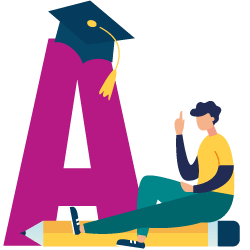TABULA SCHOOLHistory
The most basic, beginner CEF level suggests the students can introduce themselves and others, ask and answer some simple questions.

A1 Level
Candidates are able to understand very simple texts and messages, which are expressed with simple vocabulary and simple grammatical structures. They can still recognize familiar words and names and follow short, simply written directions. In addition, they are able to understand some internationalized words as well as the meaning of simply worded texts. They can also infer unknown words from context, locate list items and categorize information provided to them in a written text.
In terms of writing, candidates are able to compose a complete written message using simple words. They can refer either to themselves or to others by giving the appropriate information without difficulty. They can also fill in answers to questionnaires or quizzes and request information in a note or letter. Finally, they are able to formulate short narratives and produce written speech using information from various sources.
In the oral skill part, they are able to understand both the central idea of a text and individual information. They can understand standard and everyday phrases as well as information that is directly stated. They can grasp the main idea and meaning of texts, as well as recognize more difficult content words when they are spelled out. They also understand the function of a statement eg if it is a command, request or question and categorize information they receive in texts eg the advantages or disadvantages of a profession.
They are also expected to be able to demonstrate that they can use everyday expressions that are used to meet specific practical needs. They should show that they can respond to a conversation when the other part speaks slowly and clearly. In other words, they should be able to answer simple questions regarding either familiar topics or personal information, such as place of residence, etc.
They can describe what is asked of them with simple vocabulary and grammar, they can handle numbers, quantities, the concept of time as well as make comparisons between people, daily activities etc. They will be able to greet politely as well as respond to texts that contain simple instructions, as well as ask for clarification, always using simple vocabulary.

A2 Level
Candidates at this level should be able to understand the main idea and related information of texts, which contain high-frequency vocabulary related to entertainment, geography, etc. Having a simple and short text, they will be able to identify to whom it is addressed , the type of text etc. They can understand texts with somewhat more complex content, such as a text that refers to daily life activities or describes simple events. They can additionally isolate content related to specific information of all or part of the text. They understand texts with repeated vocabulary and its individual meanings.
The candidate will be able to express himself with simple structures on various matters such as personal, social or family. He will be able to talk about his/her needs, plans, intentions and desires. That is, s/he can compose easily, short, simple texts either giving or asking for information. S/he can also seamlessly refer to a plan, any problems e.g. at school or feelings with simple vocabulary.
S/he can write his/her opinion on familiar subjects without giving detailed reasons for his/her positions. At this level, the candidate uses a limited repertoire of words and structures. In addition, the candidate of this level can tell a simple story in simple words, as well as propose solutions for a problem. S/he can now understand and use verbs in more tenses.
In spoken language comprehension, the candidate is now able to understand both the central idea and individual messages or dialogues related to various topics such as the family, social and educational environment. These texts mainly deal with familiar everyday issues. The candidate can understand the main points of short telephone messages as well as messages concerning personal/family matters and hobbies. S/he still understands instructions given to him/her and simple instructions for making things.
The skills that have been acquired now concern both live speech and recorded texts.
The candidates can understand descriptions of events involving the present as well as the past and the future. They can understand the main points of an auditory text but also individual phrases if the speech is just clear. It is not difficult for them to understand excerpts from television or radio events. That is, the language must be able to be used in conditions suitable for its daily use. The candidates comfortably describe daily habits as well as refer to likes or dislikes. They also talk about their living conditions, their hobbies, etc.
In particular, candidates are able to exchange information and ideas on a wide range of familiar topics mainly related to aspects of daily life e.g. entertainment, food shopping and travel. They present, with simple arguments, even an opposing point of view on an issue without much analysis. They can ask for clarifications or help and respond to invitations, expressions of apology, etc. They can express an opinion or attitude in a simple way or even talk about future plans and planning movements.
They are able to infer the meaning of words or phrases that are unknown to them from their context, using appropriate pronunciation and intonation when reproducing spoken texts or dialogues. Finally, they are able to express with simple vocabulary a sequence of events using phrases such as initially, because, but, etc.

B1 Level
By reaching this level, the candidate has acquired a moderate knowledge of the language. That is, s/he can understand not only the main idea but also the main points of texts regarding work, education or entertainment issues.
The candidate can easily understand texts with a simple structure that touch on issues of family life and can recognize the origin and recipient of a specific text. S/He also distinguishes the central idea of the text, its general meaning and the topic it deals with each time. S/He can also understand what are the important points of a text, if it deals with familiar topics and locate specific information, if asked. S/He is also able to understand fairly well texts that touch on topics such as feelings or desires. In addition, s/he can understand graphs in simple form when they are contained in texts on familiar topics.
For the evaluation of written text, s/he must be able to formulate written texts coherently, expressing his/her opinion on matters concerning the general public. At this level, s/he will be able to write short texts such as a letter or an email. In these letters, s/he should be able to describe various events, even describe experiences, facts or feelings. The candidate at this level should be able to describe a problem or situation with sufficient clarity, as well as the content of a book or film. S/He can also describe his ambitions or goals and create a CV.
S/He is also able to convey in the foreign language general information of various texts which are short and formulated in Greek (mother tongue). The topics can vary, for example about the weather, the menu in a restaurant, public announcements etc. In terms of the oral assessment, candidates should now be able to understand the main idea of short oral texts (e.g. the main points of a speaker's discussion with an excellent level of the language). They will also be able to locate information from either live or recorded text on familiar topics.
They will additionally be able to understand simple technical information, arguments and also the general meaning of a lecture, if it deals with a topic familiar to them. Candidates should therefore prove that they can use the language coherently, in relevant conditions, for example during a trip. In other words, the candidate can now develop a familiar topic, summarizing the main points if necessary. S/He can also describe in detail various events and argue or oppose a familiar issue. S/he can finally propose solutions for an issue or make announcements. S/He can still make simple requests or complaints and reproduce the main points of a text s/he has read.
In conclusion, the candidate can now detect other and restore deviations of his/her speech, e.g. inappropriate intonation patterns, thus restoring communication.

B2 Level
Candidates can understand texts whether they have supplementary representations or not. They can still recognize, on the one hand the continuity between 2 or more passages, on the other hand distinguish the differences between 2 texts, which refer to the same topic. In addition, they are now able to understand written instructions, orders or hints, but also to recognize the relationship that 2 or more written texts have with each other. At the same time, they can detect the author's mood and style, as well as indicators of the identity of the author, the recipient and the possible relationship that exists between them. They are also able to not only understand the subject of reference whether it is a person, object or concept, but also identify each time what are the determining indicators of the communicative purpose of a written text.
Candidates now have the ability to describe situations, place themselves in space & time and address known or unknown persons in the correct way. They can also express wishes, apologies, congratulations, etc. They can also make requests or suggestions, but also express feelings as well as introduce a third person. They are also able to transmit verbatim the words of a third party, but also to provide or request information, clarifications or explanations.
A candidate at this level has still mastered the following skills; s/he can understand a text globally, identify its main points, locate specific information in the text if asked, recognize the speaker's style, distinguish how 2 speakers are related to each other and also restore the incomplete speech. S/He can still understand what the identity or status of the speaker is. S/He is able to approach the other part of a conversation, whether s/he is a known or an unknown person to him/her.
Among other things, candidates can narrate incidents, present a subject, and describe or characterize a person an object, a subject or a situation. If asked, they must still be able to take the floor in a conversation, but also to interrupt their counterparts using the permissible social conversational norms so as to avoid a rupture. They can still correct or complete the speech, if this is necessary and especially after a verbal or non-verbal reaction of the other speaker.
The candidate must still prove that s/he is able to mediate between 2 speakers and convey the essence of the other's words to each of them. We are not talking about translation here as the candidate may just need to convey the essential parts of a conversation or a comment. That is, the candidate is invited to present the content of a written or oral text interpretatively, but also to participate at the level of a linguistic act.
In short, the candidates should now have mastered the following skills: to choose the intonation and syntactic pattern that suits the situation, to choose the appropriate language type, to identify spelling mistakes in a written text and, respectively, in a spoken text, articulation errors , which they will restore. Finally, the candidates are asked to identify wordings characterized as either ambiguous or multi-meaning and to remove any ambiguity.

C1 Level
At this level, the candidate has to prove that s/he can understand complex and extensive texts as well as their individual points. S/He must show that s/he possesses the following skills; to be able to make predictions or assumptions in direct relation to the text, to draw conclusions about the specific situation, i.e. what may have preceded or follows the text, to infer even its general meaning. S/he must also be able to infer the author's position or opinion regarding the issue the text deals with. In addition, at this level the candidate is able to use information from a text even if it is formulated suggestively and thus answer a question or solve a problem.
In addition, s/he must still be able to interpret information provided to him/her so that s/he can respond to the requests and interpret information provided by any graphic features of the text s/he is studying. Then s/he should be able, based on specific criteria, to juxtapose or relate information provided to him/her by the text. S/He has to prove that s/he can restore, if requested, information that has been deleted and recognize opinions or attitudes even when they are silenced.
In addition, the candidate must show that s/he has mastered the way in which the language elements work. S/He will achieve this by demonstrating that s/he possesses the following skills; a) identifying linguistic elements (if present or missing) that show the attitude of the author of the respective text, b) recognizing the semantic function of lexical or grammatical objects with or without a clear meaning that can aide to this (e.g. a reminder which could also function as a warning), c) completing or varying specific words or phrases of the text so as to convey the requested meaning in a way that is nevertheless suitable for the specific communication occasion, d) identifying the linguistic means between which the coherence of a text is ensured.
In other words, the candidate is required to identify each time the means used by the author of a text in order to introduce a topic or an idea, to bring back a topic or an idea, to move on to the next topic, to summarize the conclusions reached, to refer to another text or to its author and finally to present the various sides of a subject.
In addition, and if asked, the candidate must be able to choose the grammatically correct expressions so as to complete each time or restore concepts of the text. The expressions chosen by the candidate should be appropriate for the given communication occasion.
With respect to written text, the following skills are required of the candidates; a) to be able to formulate opinions on an issue, b) to be able to clarify and, if necessary, ask for explanations, c) to convey or relate information, d) cite arguments or counter-arguments, e) examples, f) give instructions, and finally g) formulate their personal assessment or interpretation regarding a situation or event.
In written text production, its comprehension and also in oral mediation, the candidate will be asked to demonstrate the following; a) evaluate and classify information provided by a text, b) correlate and contrast information contained in a or and more texts, c) to be able to understand the type of relationship between the speakers, d) to restore information, which has not been heard, e) to project or develop ideas or arguments, f) to formulate or develop opinions, g) to give the floor to his/her counterpart and finally h) to refer to what other speakers said and formulate action plans.
C2 Level
At this level, the requirements for candidates are the same as in C1. Additional skills that must have been mastered are as follows.
Candidates must demonstrate that they can clearly distinguish particular semantic variants by using a wide range of lexical & grammatical elements appropriate for the specific situation. They should also be able to interpret information provided in combination with the text and its typography - eg the size or type of letters.
In addition, candidates should be able to produce text, which will refer to situations or experiences while clearly describing the events and in a text-like manner. They should also prove that they can make predictions or assumptions or even that they are able to formulate conclusions regarding the content of a text. They will also be able to express an evaluative comment on various topics on the one hand and produce complex articles, reports or scientific essays on the other.
In addition to this, candidates will have to prove that they are able to understand the spoken language by having mastered the following skills; a) understand complex or specialized information, b) understand the meaning of various terms or the explanation of complex concepts, c) make assumptions about information or opinions, which are not present in text, based on linguistic or extra-linguistic indicators, which are present in the specific text.
With respect to oral speech, candidates should also be able to accomplish the following; a) describe what may be asked of them in continuous and coherent speech, b) be able to use the correct idiomatic expression per circumstance, c) be able to express their disagreement and thus be able to contradict the point of view of the person they are speaking with, d) correct any inaccuracy that someone may have formulated, e) present a complex topic using the appropriate vocabulary for the target audience and f) exchange complex information or advice regarding issues related to their social environment.
And finally, they should be able to formulate their opinions regarding the question raised by other speakers in a structured and hierarchical manner.
